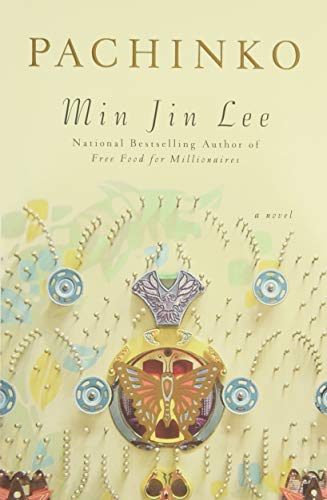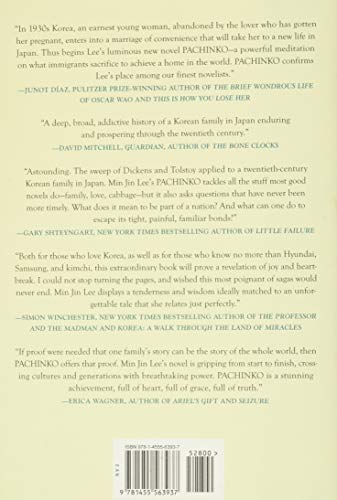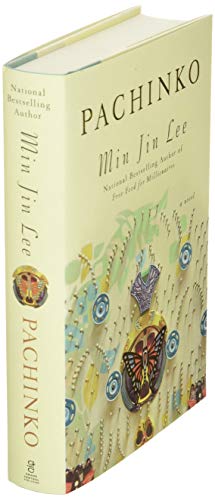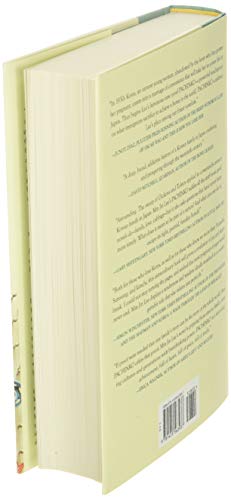Customer Services
Copyright © 2025 Desertcart Holdings Limited





Pachinko (National Book Award Finalist)



A**R
Favourite book
Loved this book
H**Y
Sad, desolate, but strangely beautiful.
I heard Min Jin Lee interviewed and quickly realised that there was a Korean/Japanese history about which I knew virtually nothing.I understood from the interview that this book took a very long time to write and that it was impeccably researched, so thought it deserved reading. There are a considerable number of characters with Korean and Japanese names and lots of words that need looking up in order to get their full meaning. I didn't even know what 'Pachinko' was and if you don't know you won't find out until about half way through the book - unless you look it up first. These are not criticisms, but I do feel that this book needs a fairly academic approach to get the most out of it. It is not an easy read. Following the lives and 'fortunes' of a Korean family who 'escape' to Japan in order to avoid starvation, it is a story of persecution and prejudice on many levels. If you like a feel-good story this is not for you, but if you can take a big dose of reality and admire the qualities of human spirit and tenacity in adversity then you will find this book both informative and deeply moving.
C**E
Masterpiece
I actually received a proof copy of this book from the Society of Authors, but unfortunately loaned it to a friend who never returned it. Fortunately, it gave me an excuse to purchase another copy.When I first finished reading Pachinko the word that came to mind was ‘masterpiece.’ So often when we think about the immigrant experience, our focus tends to shift towards Europe or the United States and we forget about how immigrants and their descendants in other countries are fighting fierce battles of their own to be recognised in countries that they’ve lived in for decades, or even been born into.Learning about the experiences of Japanese citizens of Korean heritage made me ashamed of the extent of my ignorance. My friend who I lent a previous edition of the book to disliked it, I suppose because this is not an easy read. The characters do not get happy-ever-after endings like you read about in fairytales, although it is far from a misery book. It’s true, the characters do struggle, but that’s what encouraged me to read on, to learn the different ways people react in adverse circumstances.The author of the book, Min Jin Lee, is highly articulate and personable and I remember watching her during a TV interview where she said she was keen to reclaim the stories of ordinary people that history tends to forget. She’s succeeded with Pachinko. The protagonist of the book, Sunja, a fifteen-year old who falls pregnant to her married lover had all the makings of the typical heroines you read about who become ruined women. Min Jin Lee humanises her, and gives a voice to the thousands of Korean immigrants who fled to Japan in the wake of the Korean civil war to create a different sort of life for themselves. A remarkable a achievement that’s created a book I’ll cherish forever.
J**U
Absorbing in the main but the book is slightly too long
This novel follows a Korean family through three generations and their search to be able to belong somewhere.Everything starts well by engaging the sympathies of the reader. The scene is set concisely, giving the images of life in the small town without too much of the historical background.Gradually the plot evolves throughout the rest of the book, showing the characters moving through their lives, struggling with their individual interpretations of identity. There is plenty of cultural information that is fascinating, in particular the complicated relationship between Korea and Japan. leading into the implications to the family of the Korean divide. World events move at a great pace but, in this story, we see the impact on the people.The flow of the novel is variable though. I found the start quite slow and it took me some time to get into the swing of reading, finding many excuses to put it down. I was much more engaged in the middle section but then it slowed again towards the end where there was one too many characters introduced.Generations merge and there are no clear switched from one to the next which had a very natural feel about it.Finally the end of the book approached and it was thoughtful, revisiting emotions stirred earlier in the story along with tying up many loose ends.
S**A
JUST WOW!
Set in Japan in the early 1900s, before the World War 2, historically when the Koreans were colonised by the Japanese.This book follows four generations of a Korean family which migrates to Japan and everything that follows it. There is no particular protagonist in the book and the story starts with the focus on the lives of Yangjin and Hoodie, who were boarding house keepers in Busan, Korea. They have a daughter named Sunja who falls in love with a yakuza, Koh Hansu and gets pregnant. On learning that Hansu is already married, Sunja marries Isak and moves to Osaka, Japan with him. The story keeps moving forward and focuses on the struggles, hardships and loss of the family.Pachinko is a great familial saga set in the times of war between Korea and Japan. The author, through the family’s story tries to give us a big historical context which most of us have no idea about. I felt like the book must be read by everyone because it talks about a category of people that the history deliberately wants us to forget.The book portrays the ugly side of the Japanese society and it tells us about the treatment given to different ethnic groups in Japan. Even the generations of Koreans who were born during and after the World War 2 and have lived in Japan for more than 2 decades, have got assimilated in the Japanese culture, were highly discriminated solely on the fact that were Koreans, it has portrayed the open prejudice that these people struggled with.Pachinko has lengths to talk about and it mainly focuses on the immigrants and them trying to find a home in this cruel world. It talks about the struggles of the characters with their own identity in a very hostile country and their determination to preserve and endure.Every character in the story is so compellingly written that you are invested in the story throughout. Each one of them have something or their other to teach you through their lives and struggles. The author has introduced the characters and their stories to us and has left it on us to decide and judge and interpret what we can out of it.Highly recommended, because this story needs to be heard!
A**R
Good book, but hard to finish.
Read this as it was the May book for my Girly Book Club. Again, another example of one I would not have read on my own, but that's the fun of a book club. The book was very educational, and enlightened me about a time in history I otherwise knew nothing about. I would recommend for this purpose. The first half of the book was very exciting, fast moving and enjoyable. I feel the pace dropped in the second half and the character relationships were difficult to grasp. I had to really persevere to finish this one.
Trustpilot
2 months ago
4 days ago